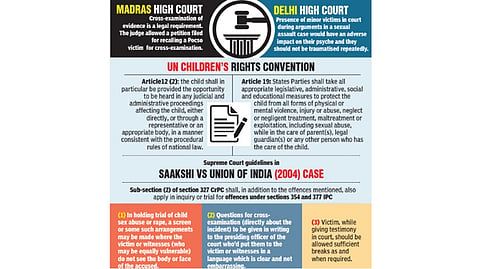

CHENNAI: The importance of cross-examination in criminal cases cannot be stressed enough. More often than not, it can mean the difference between an acquittal and conviction.
Within that context, cross-examining survivors of sexual assault, especially children under 18 years, pushes the thin line of necessity.
As per the law, every defendant has the legal right to face his/her accuser. But when the survivor is a child or youth in his/her early teens, does it make sense to enforce it?
It seems as if the Madras High Court and Delhi High Court couldn’t agree on it either, as both have come out with two different rulings for the cross-examination of survivors/victims and witnesses under the Protection of Children from Sexual Offences (Pocso) cases. In recent cases, their contradictory points of view have drawn the debate on how the Pocso victims should be treated in courts.
Differing judgments
In the case of L Subramaniyam Vs Inspector of Police, AWPS, Coimbatore East, Justice G Chandrasekharan of the Madras HC held that cross-examination of evidence is a legal requirement. He allowed a petition filed for recalling a Pocso victim for cross-examination.
However, Justice Jasmeet Singh of the Delhi HC ruled that the presence of minor victims in a courtroom during arguments in a sexual assault case would have an adverse impact on their psyche, and that should not be traumatised repeatedly.
While the perspective varies from one judge to another, the question remains on how the courts and prosecution would ensure the rights of the victim in Pocso cases is protected.
Saakshi Vs Union of India
Speaking to DT Next, former judge of Madras HC Justice (retired) K Chandru said, “The issue is not whether a victim or a witness can be summoned to appear either in a Pocso case or under any other law. It’s that in cases of child victims/witnesses how they should be examined before the court.”
The former judge pointed out the guidelines laid down by the Apex Court in the case of Saakshi Vs Union of India (2004 (5) SCC 518).
“The provisions of sub-section (2) of section 327 CrPC shall in addition to the offences mentioned also apply in inquiry or trial for offences under sections 354 and 377 IPC. In holding trial of child sex abuse or rape, firstly, a screen or some such arrangements may be made where the victim or witnesses (who may be equally vulnerable) do not see the body or face of the accused,” opined Justice Chandru.
He further added that the questions for cros-examination (directly about the incident) on behalf of the accused, should be given in writing to the presiding officer of the court who may put them to the victim or witnesses in a language which is clear and not embarrassing.
“Thirdly, the victim, while giving testimony, should be allowed sufficient breaks as and when required,” the retired justice noted, and added that there was no bar for summoning the victim/witness repeatedly if the above guidelines are followed scrupulously.
“While hearing the Podhumbu school girls case (Veerasamy Vs State of Tamil Nadu, 2012 (3) CTC 641), we had monitored the trial and directed the trial judge to follow these guidelines carefully,” the judge recalled his experience.
Conscientious practitioners needed
Should there be any change to the judicial system while conducting Pocso trials? “No,” piped back Chandru.
There was no need to bring any fresh guidelines, but a conscious judge and truthful prosecutor were both crucial to dispose of such cases at the earliest, he opined.
“In Podhumbu case, the girls were examined after six years. By then, some of them were married and had children. When they came to court, they were accompanied by their husbands. At least in 15 cases, the witnesses turned hostile. The obvious reason is that in the presence of their husbands, they do not want to recall what had happened to them,” he pointed out.
Chandru also lamented over the lack of courts that are child friendly. “Except for one place that’s a showpiece, we do not have courts that are child-friendly or even have facilities to record a child’s testimony as evidence,” he rued.
Chandru expressed his concern about the present attempt of the police to even book child-adolescent love matters as Pocso cases. “In fact, Justice PN Prakash (retired recently), while addressing the investigation officers in a case, candidly asked how adolescent love could become a crime,” he said. “The time has come for all stakeholders to ponder over the application of the Act in a proper manner and if necessary, recommend appropriate amendments.”
Sensitivity is key
Senior Advocate and noted criminal lawyer PVS Giridhar said though as per Section 33 (5) there was a bar on the number of times you can summon victims repeatedly, the accused can file a petition under Section 311 of CrPC to cross-examine the victim to prove that he was innocent.
“However, extra sensitivity should be shown during cross-examination in courtrooms. You cannot harass the victim during cross-examination. Though it can be done through online mode, flaws would occur when someone feeds the victim. Therefore, a sensitised court and prosecution should be there to render justice,” explained Giridhar.
The senior lawyer also welcomed the order of Justice Chandrasekharan for asking the accused to bear the expenditure for the victim’s appearance.
“India is the signatory of the UN Children’s Rights Convention, as per Articles 12 and 19 of the convention. The rights of the children to express their thoughts and participation cannot be wiped out,” the advocate noted.
Visit news.dtnext.in to explore our interactive epaper!
Download the DT Next app for more exciting features!
Click here for iOS
Click here for Android